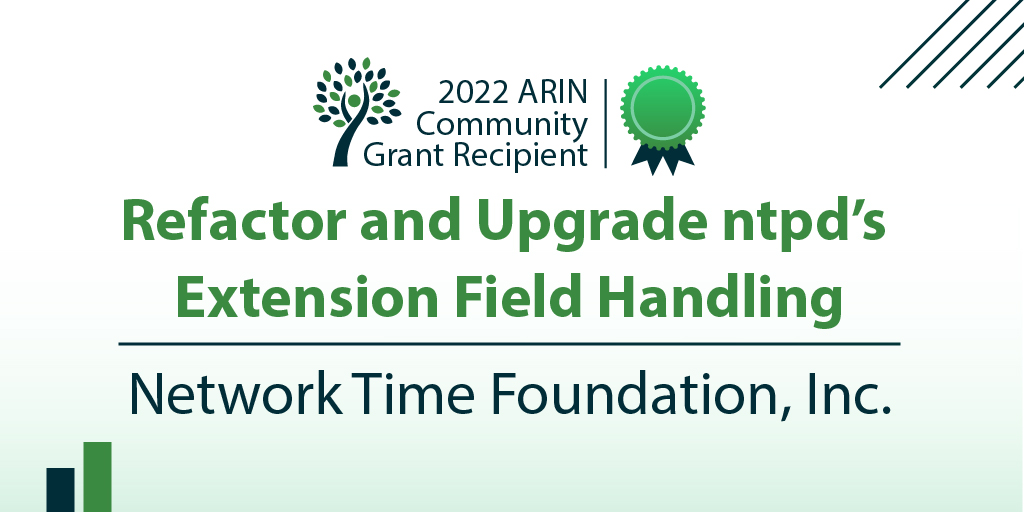
Refactor and Upgrade ntpd’s Extension Field Handling
2022 ARIN Community Grant Program Recipient Report
Network Time Foundation (NTF) received an ARIN Community Grant in 2022 to align the Network Time Protocol (NTP) Project’s Reference Implementation with evolving standards while preserving legacy compatibility. Autokey, a significant feature of NTPv4 introduced in 1997, had gained prominence in the NTP community, culminating with the publication of the NTPv4 Standards in 2010. However, the project needed to reconcile discrepancies between the legacy codebase and the updated Extension Field headers.
Autokey was replaced with Network Time Security (NTS), and, to support both Autokey users and evolving standards, we began the complex task of reconciling Extension Field formats. The grant enabled the integration of the previous Extension Field work with the current codebase. Rigorous testing ensured that this integration did not introduce bugs. The effort involved 126 changed files, 1,089 lines of code, and 30,283 characters.
Learn more about all the 2022 ARIN Community Grant Program Recipients.
Impact of the Project
While a limited audience has seen this effort’s immediate impact, its inclusion in the Reference Implementation of NTP will soon be seen and used by millions of users, given that the NTP Project’s NTP software has been the gold standard for synchronized time since the 1980s. We anticipate widespread adoption of ntp-4.4 upon its release.
Our focus on NTS — our most asked-for feature — addresses a crucial industry need, benefiting reference clock vendors, operating system (OS) vendors, enterprise users, NTP Pool operators, and the broader NTP community. The improvements in ntp-4.4 are expected to incentivize users to upgrade by offering improved time synchronization, enhanced security, and reduced NTP-related distributed denial-of-service (DDoS) vulnerabilities.
NTF used the ARIN 2022 Community Grant to achieve a significant milestone in the evolution of NTP, driven by a commitment to modernize while honoring legacy users. The grant was pivotal in achieving these outcomes, ensuring that ntp-4.4 will deliver enhanced time synchronization, security, and reliability to the global Internet community.
Watch the video presentation of NTF’s project update on YouTube.
What’s Next?
The grant funding enabled this key stage of our work to be completed, and we are very happy to say that the results will enable us to complete and deliver the next major release of the Reference Implementation of NTP, ntp-4.4. To do so, we’ll merge this work into the ntp-dev code branch, release ntp-4.2.8p18 (without this work), engage testers with ntp-dev, and ultimately finalize ntp-4.4.
About the ARIN Community Grant Program
ARIN provides financial grants in support of initiatives that improve the overall Internet industry and Internet user environment. Are you working on a project that advances ARIN’s mission and broadly benefits the Internet community within the ARIN region through informational outreach, research, Internet technical improvements, or Registry processes and technology improvements? Visit the ARIN Community Grant Program page for more information and to find out how your organization can apply in 2024. For application tips and support, read this post on our blog.
Any views, positions, statements, or opinions of a guest blog post are those of the author alone and do not represent those of ARIN. ARIN does not guarantee the accuracy, completeness, or validity of any claims or statements, nor shall ARIN be liable for any representations, omissions, or errors contained in a guest blog post.
Recent blogs categorized under: Grant Program
GET THE LATEST!
Sign up to receive the latest news about ARIN and the most pressing issues facing the Internet community.
SIGN ME UP →Blog Categories
Fellowship Program • Caribbean • IPv6 • ARIN Bits • Tips • Updates • Elections • Outreach • Security • RPKI • Public Policy • Guest Post • Grant Program • Data Accuracy • Business Case for IPv6 • Internet Governance • Training • IPv4 • Customer Feedback • IRR


